Delicious Specialty foods of Malaga, Spain
The coastline region of Malaga, Spain is well known for the many agricultural farms and specialty foods that come from this region of the country. Specialtizing in abundant seafood, specialty ingredients and produce grown in the region, you’ll enjoy trying all the fresh products and specialty food that comes directly from purveyors, specialty growers and producers in the area, along with finished goods and local restaurants that feature these local products and ingredients in their menus.
I love all the fresh ingredients and specialty foods from Malaga area, everything is so fresh and in season. Also, the multitude of public markets selling produce and products from the area is truly amazing, being the bread basket growing area for most of Spain if not a good portion of Europe.
Try these Specialty foods of Malaga, Spain when you visit the area
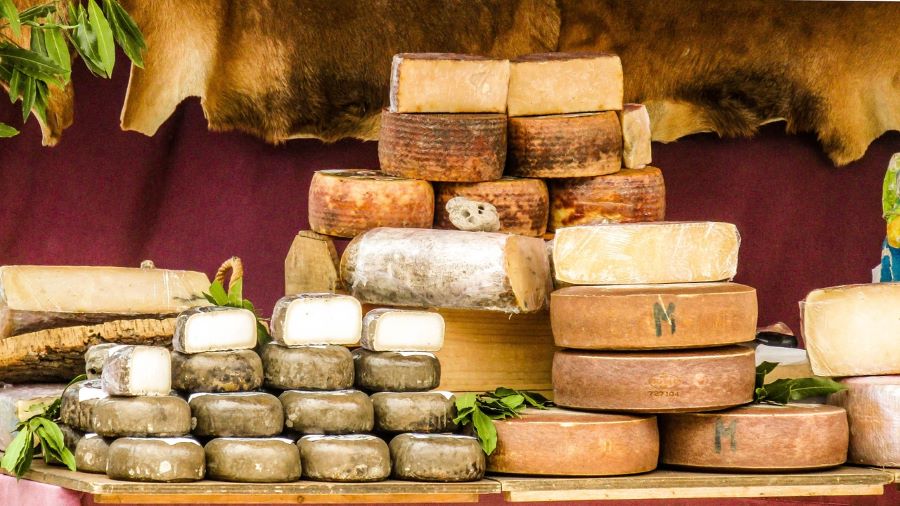
Málaga’s Agricultural Significance
Málaga stands as an exceptional agricultural jewel within Spain’s diverse landscape, blessed with a unique microclimate where subtropical Mediterranean conditions merge with protective mountain ranges to create near-perfect growing conditions. This rare convergence allows for an extraordinarily long growing season where subtropical fruits like mangoes, avocados, and cherimoya flourish alongside traditional Mediterranean crops such as olives and almonds—a diversity few European regions can match. The province’s abundant sunshine (over 300 days annually), minimal frost risk, and strategic irrigation systems fed by mountain snowmelt create an agricultural paradise where farmers can cultivate premium crops year-round.
Beyond its natural advantages, Málaga has developed a sophisticated agricultural infrastructure that perfectly balances centuries-old traditions with cutting-edge innovation. The province has become internationally renowned for its sweet Moscatel grapes and raisins, distinctive olive oils from mountain groves, and pioneering tropical fruit production that makes Spain the only European country commercially growing mangoes and avocados. This agricultural richness not only supports Málaga’s celebrated gastronomy and wine culture but also creates a resilient economic pillar that complements its tourism industry, allowing the region to preserve its cultural heritage while embracing sustainable agricultural practices that respond to climate change challenges and evolving market demands.
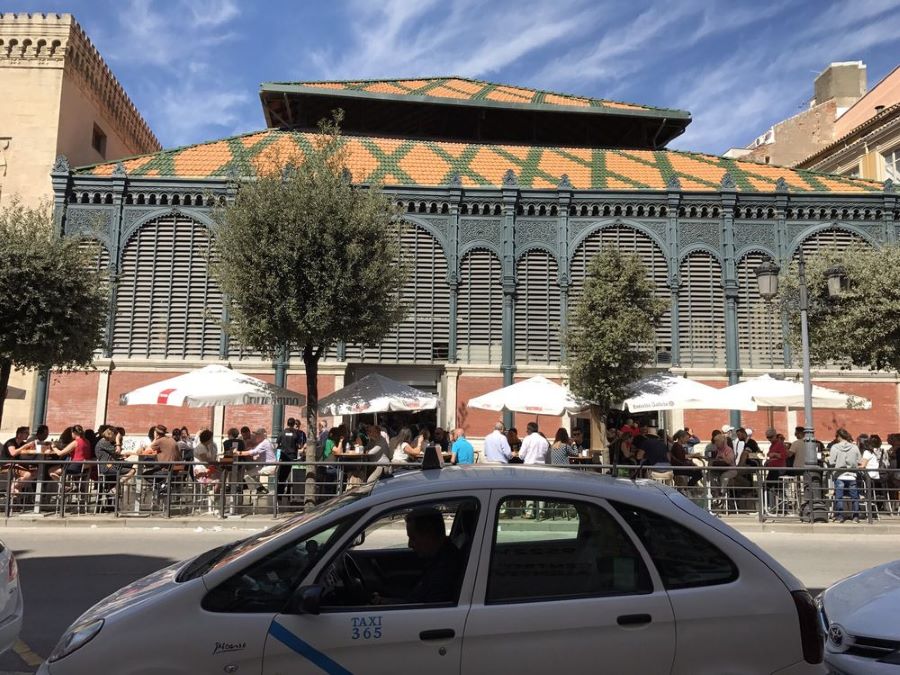
Climate and Geography:
- Malaga’s location along the Costa del Sol in southern Spain provides it with a Mediterranean climate characterized by mild, wet winters and hot, dry summers. This climate, combined with the region’s varied geography, including mountains, valleys, and coastal areas, creates an ideal environment for growing a wide range of crops.
Abundant Sunshine:
- Malaga enjoys abundant sunshine throughout the year, which is vital for the cultivation of many crops, including olives, citrus fruits, and grapes for wine production.
Olive Oil Production:
- Malaga is renowned for its olive oil production. The groves of Malaga yield some of the finest olive oils in Spain. The warm, sunny days and cool nights contribute to the exceptional flavor and aroma of the local extra virgin olive oils.
Fruit Orchards:
- The region is famous for its citrus fruits, including oranges, lemons, and grapefruits. These fruits thrive in Malaga’s Mediterranean climate and are harvested year-round.
Wine Production:
- Malaga has a long history of wine production. The vineyards here produce a variety of wines, including sweet dessert wines like Moscatel and Pedro Ximénez, which are highly regarded both nationally and internationally.
Seafood Abundance:
- Located along the Mediterranean coast, Malaga benefits from an abundance of seafood. The local fishing industry provides fresh catches like sardines, anchovies, and red mullet, making seafood a staple in the regional cuisine.
Unique Local Products:
- Malaga’s agriculture and climate have given rise to unique local products like Malaga raisins, which are known for their sweetness and quality. These raisins are often used in desserts and confections.
Traditional Culinary Heritage:
- Malaga’s culinary heritage is deeply rooted in tradition. Local dishes and recipes have been passed down through generations, ensuring the preservation of authentic flavors and cooking techniques.
Local Markets and Craftsmanship:
- The region boasts vibrant local markets and artisans who produce handcrafted goods like ceramics, textiles, and leather products. These markets contribute to the region’s unique cultural and gastronomic identity.
Sustainable Farming Practices:
Many local producers in Malaga prioritize sustainable and organic farming practices, respecting the environment and ensuring the long-term health of their crops.
In summary, Malaga stands out as a special growing region and producer of local foods and products due to its climate, geography, and commitment to preserving traditional agricultural practices. The region’s culinary delights, from olive oil and wine to citrus fruits and seafood, reflect the unique character and flavors of this beautiful part of southern Spain
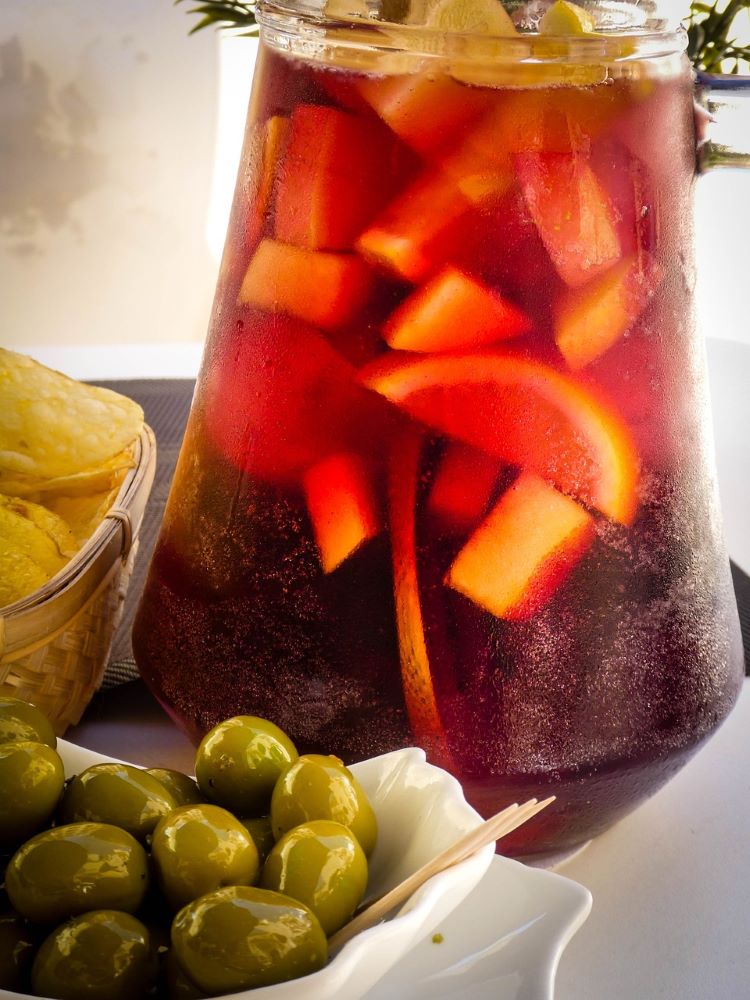
Specialty produce and products from the Malaga Region
Malaga, Spain is known for its rich culinary traditions and diverse food culture. Here’s an outline of some specialty foods, produce, and finished local goods produced and sold locally in Malaga:
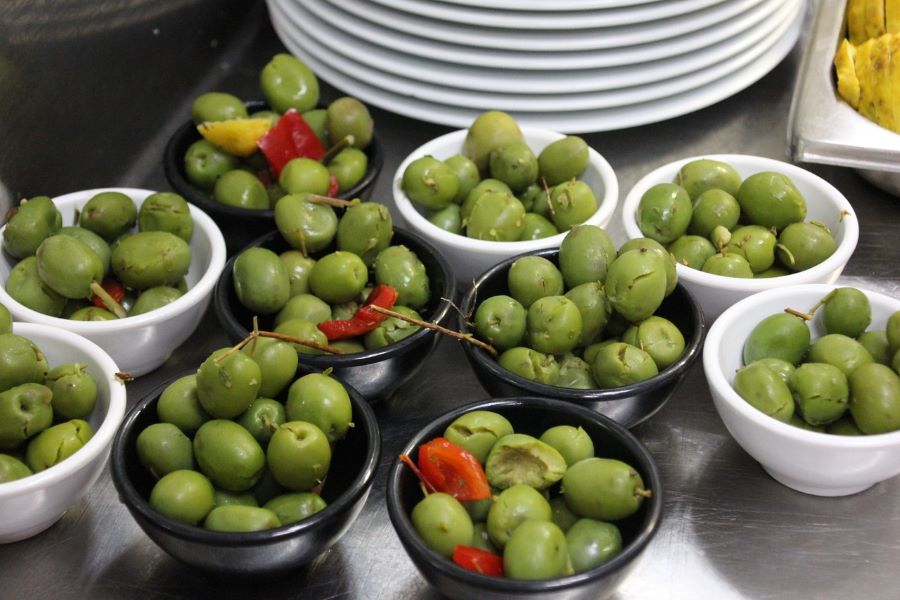
Olive Oil:
- Malaga is renowned for its high-quality olive oil. The region’s warm climate and fertile soil are ideal for olive cultivation, resulting in flavorful and aromatic oils. Look for Extra Virgin Olive Oil (EVOO) produced in local olive groves.
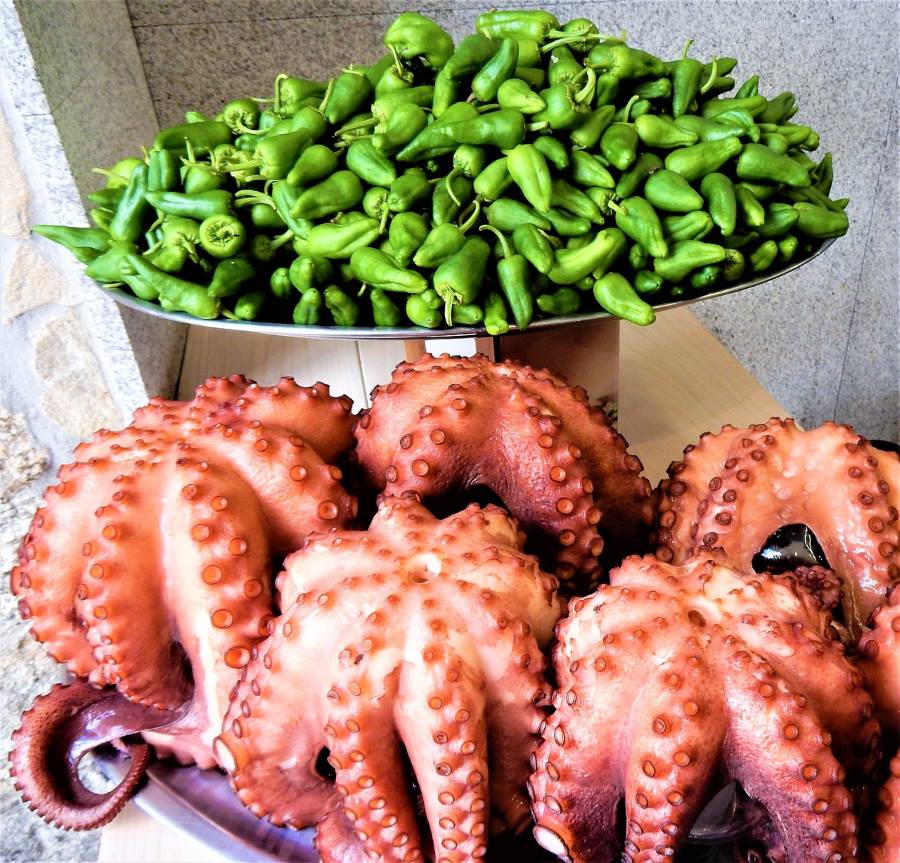
Fresh Seafood:
- Located on the Costa del Sol, Malaga offers an abundance of fresh seafood. Popular catches include sardines, anchovies, red mullet, and sea bream. These can be grilled or fried and are often served with a squeeze of lemon.
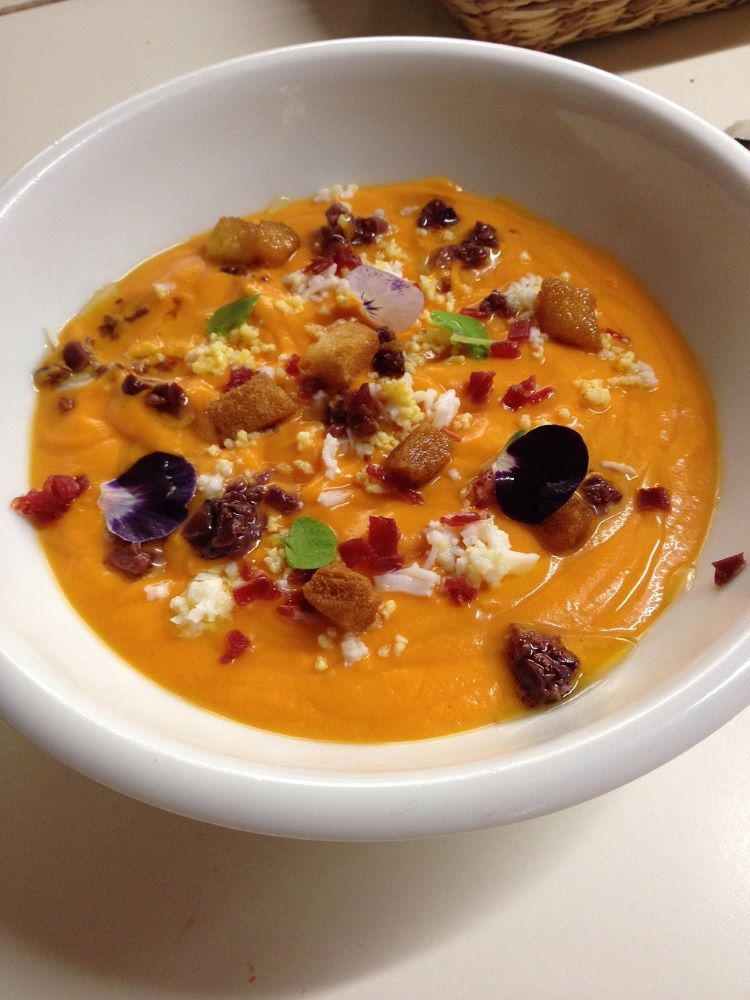
Gazpacho:
- This cold tomato-based soup is a refreshing local specialty, perfect for the hot Malaga summers. It’s made with tomatoes, peppers, cucumbers, onions, garlic, and olive oil, all blended to perfection.
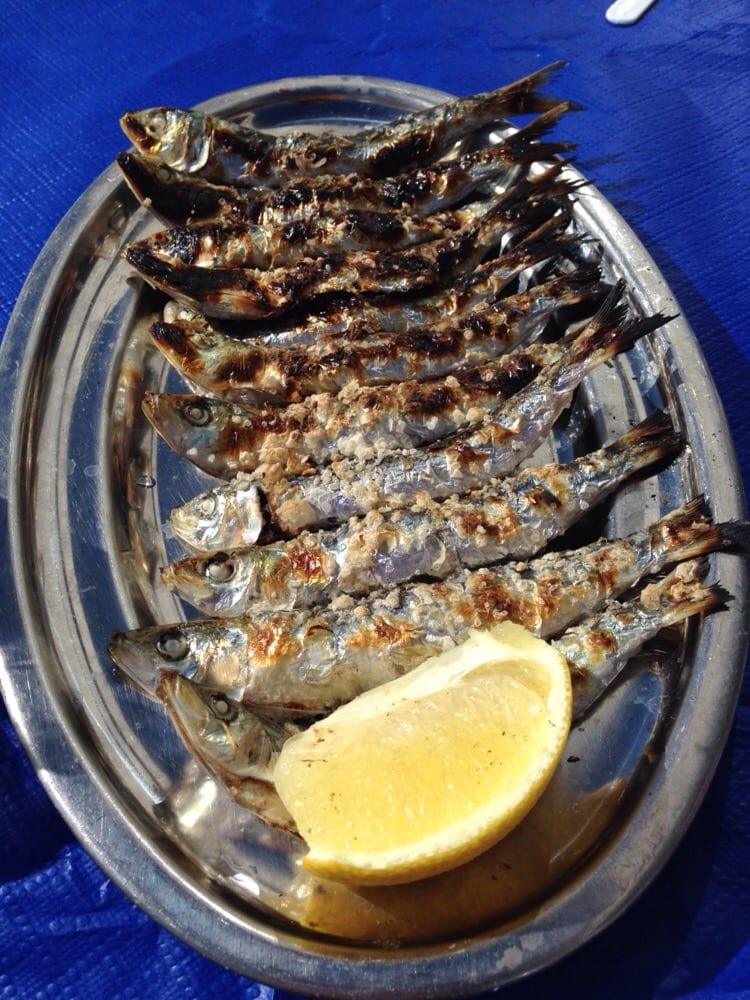
Espetos de Sardinas:
- A must-try local snack, espetos de sardinas are skewered and grilled sardines, typically cooked over an open flame on the beach. They’re simple yet incredibly flavorful.
Malaga Raisins:
- Malaga is known for producing sweet and succulent raisins. These raisins are often used in local desserts and dishes, adding a touch of natural sweetness.
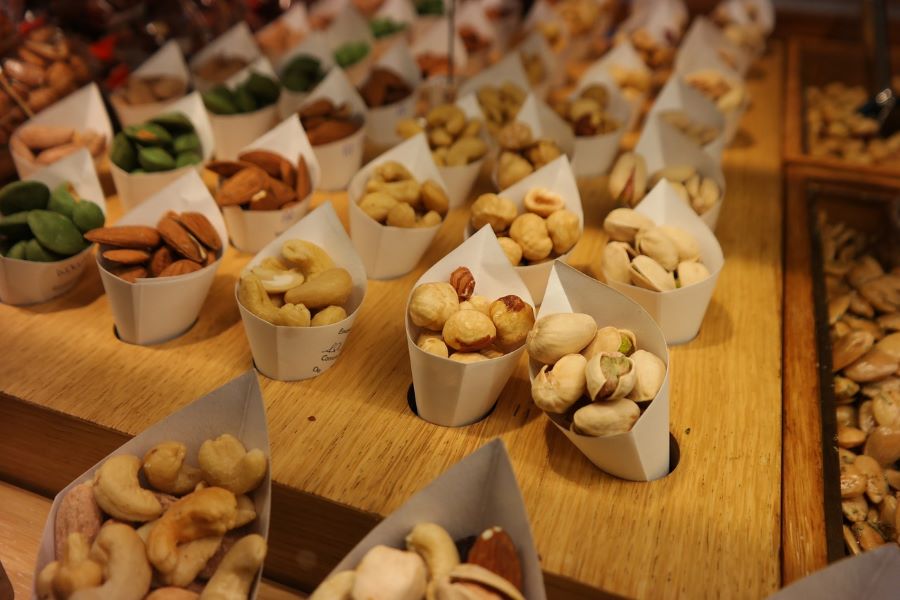
Almonds and local nuts:
- The region is famous for its almond production, and you can find a variety of almond-based products, including marzipan, almond pastries, and almond-flavored drinks.
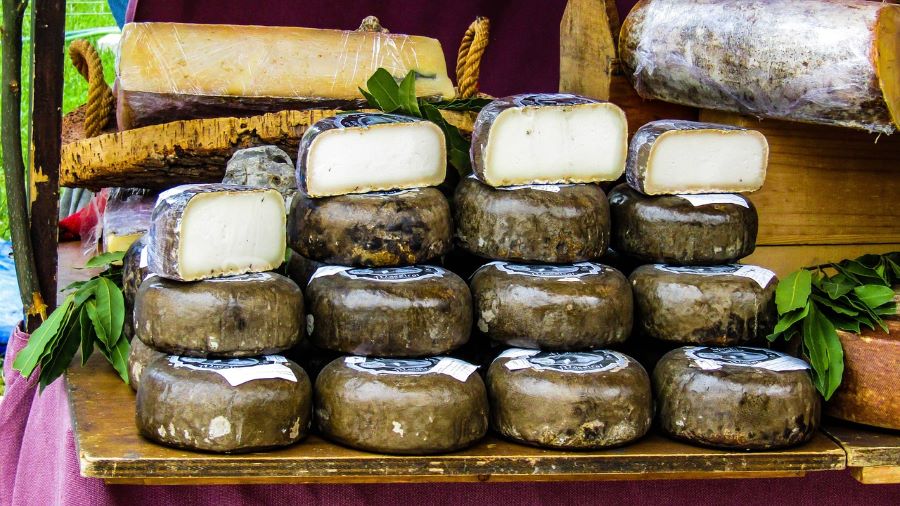
Local Cheeses:
The Malaga region in southern Spain is not particularly known for its cheese production compared to other regions in Spain. However, there are some local cheeses that you can find in Malaga and the surrounding areas. These cheeses often reflect the influence of Andalusian culinary traditions. Here are a few examples:
Queso de Cabra Malagueña:
This is one of the more distinctive local cheeses from the Malaga region. It’s a goat cheese made from the milk of the Malagueña breed of goats. This cheese can range from mild and creamy to semi-cured with a stronger flavor.
Payoyo Cheese:
While Payoyo cheese is more associated with the nearby region of Cadiz, it is sometimes available in Malaga. It’s a goat cheese made in the Sierra de Grazalema Natural Park and is known for its rich, nutty flavors and varying degrees of aging.
Torta del Casar:
While not strictly a Malaga cheese, you may find Torta del Casar, a creamy sheep’s milk cheese from the Extremadura region, in some Malaga markets and cheese shops. It’s a soft, spreadable cheese with a strong, savory taste.
Manchego Cheese:
Although Manchego cheese is more closely associated with the La Mancha region of Spain, it’s a popular cheese throughout the country and is often available in Malaga. Manchego is a sheep’s milk cheese with a distinctive flavor and is typically aged to various degrees.
Various Goat and Sheep Cheeses:
Malaga may also offer a selection of artisanal goat and sheep cheeses from neighboring regions. These cheeses can vary in flavor and texture depending on their age and production methods.

Sweet Desserts:
- Malaga is known for its sweet treats, including the famous Malaga wine, a sweet fortified wine often served with desserts. Additionally, indulge in traditional sweets like borrachuelos (deep-fried pastries) and torta malagueña (a sweet almond cake).

Local Wines:
The Malaga region in southern Spain is known for producing a variety of wines, many of which have gained recognition for their unique flavors and characteristics. The most famous wines from the Malaga region are typically sweet, fortified wines, but there are also some dry wines produced. Here are some of the local wines grown around the Malaga region:
Moscatel de Málaga:
- Moscatel de Málaga is one of the most renowned wines from the region. It is a sweet, fortified wine made from Muscat grapes, specifically the Muscat of Alexandria variety. The wine has a rich, aromatic, and floral bouquet with flavors of orange blossom, dried fruits, and honey. It is typically enjoyed as a dessert wine and pairs well with pastries and desserts.
Pedro Ximénez (PX):
- Pedro Ximénez is another sweet, fortified wine produced in the Malaga region. It is made from the Pedro Ximénez grape variety and is known for its intense sweetness, viscosity, and flavors of figs, raisins, and caramel. PX wines are often used in cooking and as a complement to desserts.
Malaga Dulce:
- Malaga Dulce, also known as Malaga Wine, refers to a range of sweet wines produced in the Malaga region. These wines can be made from various grape varieties, including Moscatel and Pedro Ximénez, and can vary in sweetness levels. They are typically enjoyed as aperitifs or dessert wines.
Malaga Seco:
- In addition to sweet wines, some wineries in the Malaga region produce dry or semi-dry white wines and red wines. These wines are made from local grape varieties and may have characteristics of the Mediterranean climate and terroir. They can be a great accompaniment to local cuisine.
Montes de Málaga Wines:
- The Montes de Málaga sub-region is known for producing red wines from indigenous grape varieties like Romé and Garnacha. These wines often have a rustic character with fruity notes and are worth exploring if you’re interested in regional red wines.

Local Crafts:
In addition to food, Malaga offers a variety of locally-made crafts and goods, such as ceramics, textiles, and handcrafted leather products. These can make for unique souvenirs or gifts.
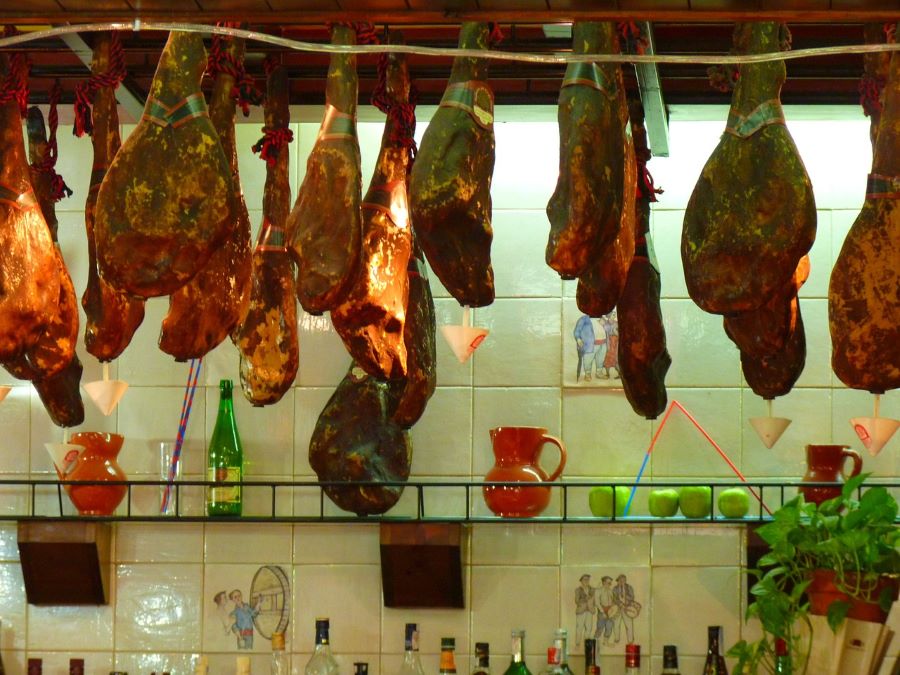
Jamón Iberico:
While not exclusive to Malaga, Jamón Iberico is a beloved Spanish delicacy. Look for local producers who offer high-quality, cured ham, often enjoyed as tapas.
While Malaga is not typically associated with the production of Jamón Ibérico, which is more closely tied to regions like Extremadura, Andalusia, and especially, the area of Huelva in southwestern Spain, it is possible to find Jamón Ibérico in Malaga. Malaga, as a tourist destination and a major city in Andalusia, often features a diverse range of Spanish culinary products, including Jamón Ibérico, in its markets, restaurants, and specialty food shops.
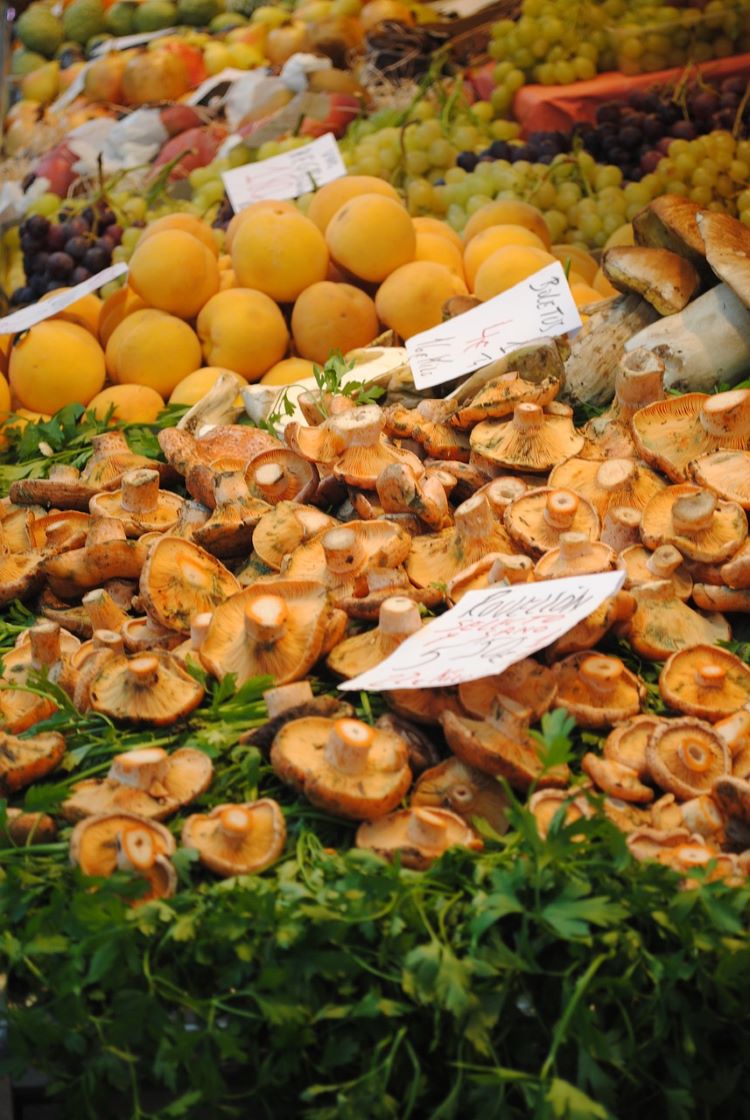
Local Markets:
Visit the local markets such as Atarazanas Market and Mercado de Salamanca to explore a wide range of fresh produce, meats, cheeses, and artisanal products. It’s a great way to experience the local food culture.
These specialty foods, produce, and finished goods reflect the rich culinary heritage of Malaga, and tasting them is an essential part of experiencing the vibrant and diverse food scene in this beautiful Spanish region.
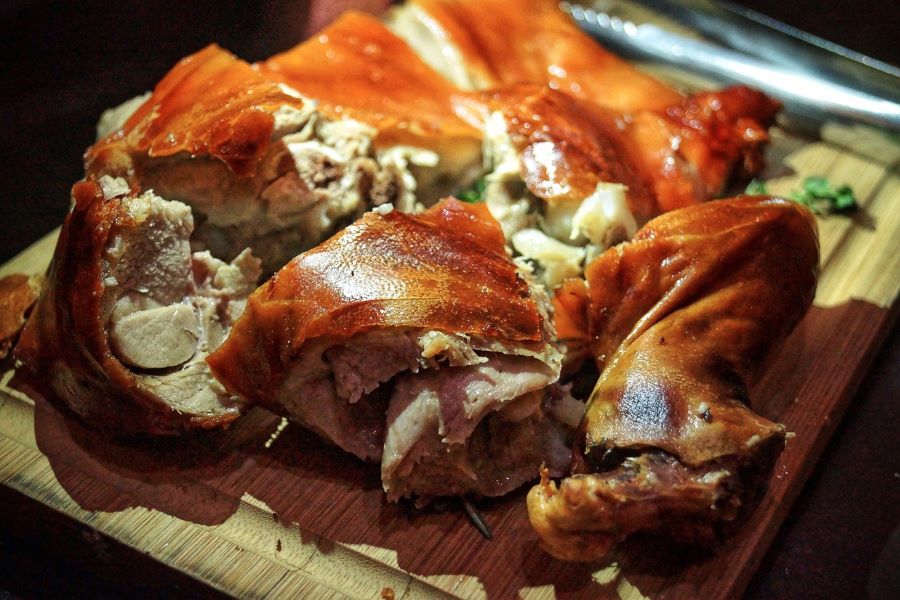
Restaurants in Malaga featuring locally produced products and ingredients
Here are some restaurants in Malaga that were known for featuring farm-to-table and local ingredients in their menus. Please note that restaurant offerings and popularity can change, so it’s a good idea to check the latest reviews and availability when planning your visit:
El Mesón de Cervantes:
Located in the heart of Malaga, this restaurant emphasizes local and seasonal ingredients in its dishes. They offer a mix of traditional Andalusian cuisine and modern interpretations.
KGB (Kisko García Bar):
KGB is a renowned tapas bar where you can expect creative dishes made with fresh, local produce. The menu often changes to reflect what’s in season.
Restaurante Amador:
Chef Amador Fernández, a Michelin-starred chef, focuses on using local ingredients to create innovative and beautifully presented dishes. The restaurant offers a tasting menu that showcases the best of the region.
El Refectorium Catedral:
Located near Malaga Cathedral, this restaurant prides itself on using local, artisanal ingredients to create traditional Andalusian and Mediterranean dishes with a modern twist.
Restaurante José Carlos García:
Situated at the Muelle Uno waterfront area, this Michelin-starred restaurant places a strong emphasis on locally sourced seafood and seasonal ingredients in its contemporary Spanish cuisine.
Tapeo de Cervantes:
This cozy tapas restaurant is known for its commitment to fresh, local ingredients. You can enjoy a variety of tapas, showcasing the flavors of Andalusia.
Restaurante El Túnel:
Located in the charming town of Nerja, just outside Malaga, El Túnel offers Mediterranean cuisine with an emphasis on locally caught seafood and locally grown produce.
Restaurante El Pimpi:
While it’s more known for its historic setting and extensive wine cellar, El Pimpi also features traditional Andalusian dishes made with local ingredients.
La Deriva Restaurant:
Situated in the Malaga Soho district, La Deriva offers a creative menu with an emphasis on seasonal and local ingredients, including fresh seafood and produce.
Please keep in mind that the status and offerings of restaurants can change over time, so it’s advisable to check the latest information, reviews, and availability before making a reservation or visiting any of these establishments.
Check out these other posts about Visiting Malaga, Spain
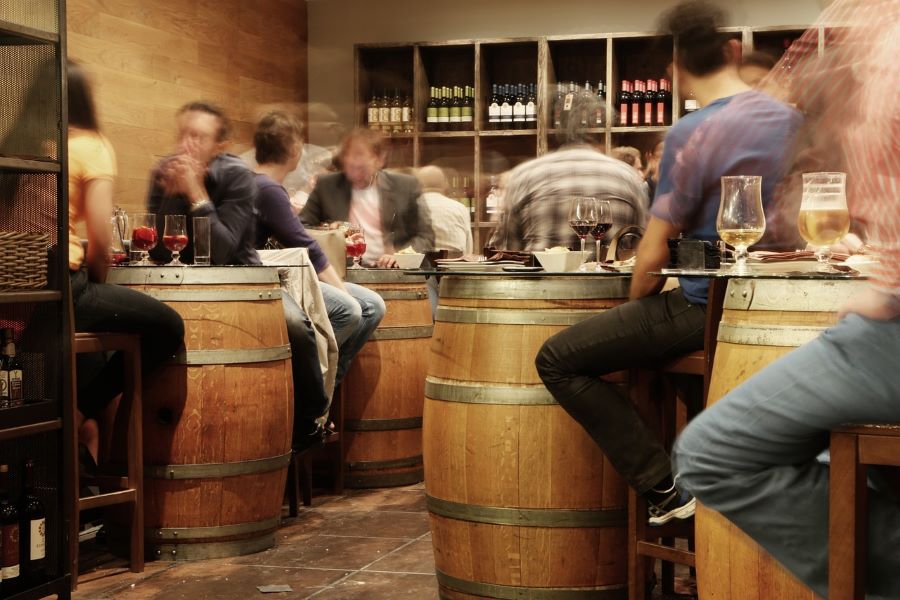
Conclusion to Specialty foods of Malaga, Spain
In conclusion, the specialty foods of Malaga, Spain, offer a captivating journey into the heart of Andalusian gastronomy. This enchanting region, blessed with a Mediterranean climate and fertile soil, yields a treasure trove of flavors that captivate the senses. From the golden olive oils and succulent seafood that grace the tables to the sweet wines and delectable desserts that satisfy the sweetest cravings, Malaga’s culinary heritage is a testament to its rich history and diverse culture.
The commitment to using locally produced ingredients and embracing farm-to-table practices underscores the region’s dedication to preserving its culinary traditions while embracing innovation. Dining in Malaga is not just a meal; it’s an exploration of the land’s bounty, a celebration of its unique terroir, and a testament to the skill and passion of its chefs and artisans.
Whether you’re savoring the smoky aroma of espetos de sardinas on a coastal beach, indulging in the velvety sweetness of Moscatel wine, or sipping on locally sourced olive oil, Malaga’s specialty foods beckon you to partake in an authentic, unforgettable culinary experience. These flavors are more than just sustenance; they are a journey through history, culture, and the natural beauty of this remarkable Spanish region. Malaga’s specialty foods are a true delight for the palate and a reflection of the vibrant soul of Andalusia.

About author – Noel Morata
After relocating from the United States to Andalusia in 2024, I’ve made it my mission to discover every corner of Spain. Based just east of Granada, I’ve spent over 12 months exploring Andalusia province and the rest of Spain, including multiple extended visits to Granada throughout different seasons. My background in Spanish cultural studies and years of residence and exploring all of Spain have given me unique insight into the region’s historical significance, local customs, and culinary traditions.
I regularly update my guides with the latest information gathered through personal visits and relationships with local tourism officials, always seeking what’s new and exciting in each destination. As a self-proclaimed foodie, I’m passionate about discovering authentic local markets and regional specialties.
Disclosure – some of the links above to various tours, transportation and hotels are affiliate links that benefits our site if you book here and we appreciate your support. The links are competitive, and you are not paying above what other affiliates provide.

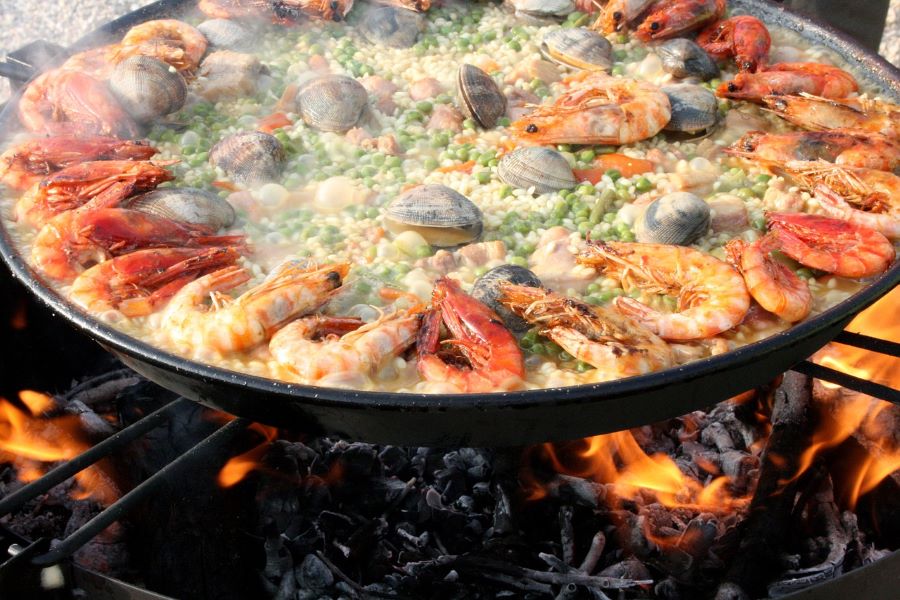
6 thoughts on “Specialty foods of Malaga, Spain”